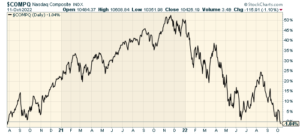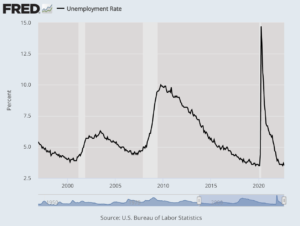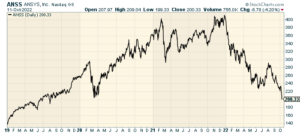CWS Market Review – October 11, 2022
The Nasdaq Falls to a Two-Year Low
In last week’s issue, I included a picture of Lucy holding the ball in place for Charlie Brown to kick. The reference is to how bear-market rallies tempt us into thinking the coast is clear, only to punish us again.
In this week’s issue, I’m including this update:

Once again, Lucy pulled the ball away and poor Charlie Brown went flying head over heels. That’s pretty much what happened on Wall Street over the last week.
Last week, the market gave us a brief but strong rally on Monday and Tuesday, and it’s taken it all back since then. The Nasdaq Composite closed today at its lowest level since July 28, 2020 (see chart below). Today’s intra-day low for the S&P 500 was its lowest since November 23, 2020. The index closed the day a hair above its recent low from September 30, which itself was a two-year low.

It’s a mess out there. Meta Platforms (formerly Facebook) is lower than where it was six years ago. We’re still seeing the trend I’ve talked about many times: risky stocks are getting hammered while conservative stocks are holding up relatively well. In today’s trading, the S&P 500 Low Vol Index rose 0.57% while the S&P 500 High Beta Index fell by 1.85%. It’s all about the Fed, the Fed and the Fed.
The recent selling was spurred in part by last Friday’s jobs report. To be fair, the report was a combination of good and bad news.
According to the report, the U.S. economy created 263,000 new jobs last month. That was below Wall Street’s expectations of 275,000. It also tied for the smallest monthly increase since April 2021. The unemployment rate ticked down to 3.5%.
Even though the jobs number was short of estimates, the futures market increased its odds that the Fed was going to raise interest rates by 0.75% at its November meeting. The odds are now up to 83% and the meeting is only three weeks away. I think it’s clear that the Fed intends to hike by 75 basis points in November.
More important than my opinion is the bond market’s. The one-year Treasury got to 4.28% today. That’s a 15-year high.
Also in the jobs report, the government said that the labor force participation rate fell to 62.3%. The U-6 unemployment rate, which is a broader measure, fell to 6.7% from 7% in August.
From a sector view, leisure and hospitality led the gains with an increase of 83,000, a rise that still left the industry 1.1 million jobs short of its February 2020 pre-pandemic levels.
Elsewhere, health care added 60,000, professional and business services rose 46,000 and manufacturing contributed 22,000. Construction was up 19,000 and wholesale trade climbed 11,000.
A drop of 25,000 in government jobs was a big contributor to the report missing expectations. Hiring at the state and local level is highly seasonal, so the decline points to a report that otherwise was largely in line with expectations and that shows a resilient jobs market.
Also on the negative side, financial activities and transportation and warehousing both saw losses of 8,000 jobs.
Another weak spot continues to be wages. For September, wages rose by 0.3%, which matched estimates. Over the past year, wages are up by 5%. While that sounds good, it’s less than the rate of inflation. In real terms, many Americans are seeing their wages getting cut. Inflation hurts so many folks who are already struggling. There are now 1.7 jobs per every unemployed person.

The next big test for the market will come on Thursday when the government releases the inflation report for September. The last report shocked Wall Street as it showed that inflation is still not under control.
Over the last 12 months, inflation is running at 8.26%. For Thursday, Wall Street expects to see consumer prices increase by 0.2% for September, and it expects the 12-month rate to fall to 8.1%.
The price for oil plays a major role in the inflation stats. While the price for gasoline had been dropping for several weeks, that seems to have ended about a month ago, and gasoline has been steadily increasing since then.
In last month’s report, the core rate of inflation came in at 0.6% which doubled expectations. That was a shocker. For September, Wall Street expects the core rate to rise by 0.4%. For the last 12 months, economists expect the core inflation rate to be 6.5%.
The equation is simple. Once inflation is under control, then the Fed won’t have to raised rates as aggressively. That’s good for the economy and earnings. It also takes some pressure off the dollar which has jumped higher against so many currencies. In the U.K., the Bank of England has been buying bonds in an effort to protect pension funds. The bond market there has has crumbled.
Inflation impacts so many different sectors at the same time. It’s so important that the Fed puts inflation back in its bottle.
Giving Another Look at Ansys
I’ve been a big fan of the company Ansys (ANSS) for some time. Unfortunately, I’ve not been such a big fan of the stock. The shares have often been very expensive. Very, very expensive.
Ansys makes simulation software for engineers. Whenever you see a designer working with a 3-D model on a computer screen, there’s a good chance that he or she is using Ansys software. Before building a bridge, a skyscraper or an airplane, the designer wants to make sure that it can withstand the pressure it will experience in real life.

Ansys is a classic “wide moat” company. Once a customer starts using their software, there’s a good chance he or she will become a long-term buyer. Ansys maintains an operating profit margin in excess of 35%, and their gross margin runs around 90%. That’s very attractive.
As you might guess, Ansys is not exactly a value stock, but I think there are occasions when it’s worth it to pay extra for an outstanding company. I saw a good opportunity for us to add Ansys to the Buy List. That was at the beginning of 2020 and the stock did very well for us. In 2020, Ansys gained more than 41% for us. I kept ANSS on in 2021, and it gained another 10% for us.
I loved the profits but again, I was concerned about the valuation. After some careful consideration, I decided to not include it on our Buy List for 2022. That’s a tough move to sell your winners. You can’t help but feel attached to them, but investing is about business, and loyalty to a stock is not important. The simple fact was that Ansys had become way too expensive.
As it turned out, our decision was almost perfectly timed. Shares of Ansys are down more than 50% this year. The business has been holding up well and Ansys has continued to beat expectations. In August, Ansys reported very good Q2 earnings. The company made $1.77 per share which beat estimates by 17 cents per share.
For Q3, Ansys expects earnings to range between $1.56 and $1.70 per share. For the entire year, Ansys expects earnings to range between $7.50 and $7.88 per share. For next year, Wall Street expects $8.49 per share.
That means that Ansys is going for less than 24 times next year’s earnings. That’s pricey, but it’s not bad for Ansys. It’s funny how a good stock can drop in half and suddenly, everyone’s afraid to own it. I can tell you that I’m seriously considering adding Ansys back onto our Buy List. I won’t make our final decision until late December.
Before I go, I have a quick story to share with you. In last week’s issue, I discussed how Elon Musk finally agreed to buy Twitter. I thought I’d ingratiate myself so I tweeted:
Elon Musk is the kindest, bravest, warmest, most wonderful human being I've ever known in my life.
— Eddy Elfenbein (@EddyElfenbein) October 4, 2022
Most people recognized the line from the movie, The Manchurian Candidate. One outfit that did not was the newspaper, The Independent. My tweet is quoted at the end of their story. Apparently, old Sinatra movies don’t hold the shared cultural value I thought.
That’s all for now. I’ll have more for you in the next issue of CWS Market Review.
– Eddy
P.S. If you want to learn more about the stocks on our Buy List, please sign up for our premium service. It’s $20 per month, or $200 per an entire year.
Posted by Eddy Elfenbein on October 11th, 2022 at 8:11 pm
The information in this blog post represents my own opinions and does not contain a recommendation for any particular security or investment. I or my affiliates may hold positions or other interests in securities mentioned in the Blog, please see my Disclaimer page for my full disclaimer.
-
-
Archives
- April 2025
- March 2025
- February 2025
- January 2025
- December 2024
- November 2024
- October 2024
- September 2024
- August 2024
- July 2024
- June 2024
- May 2024
- April 2024
- March 2024
- February 2024
- January 2024
- December 2023
- November 2023
- October 2023
- September 2023
- August 2023
- July 2023
- June 2023
- May 2023
- April 2023
- March 2023
- February 2023
- January 2023
- December 2022
- November 2022
- October 2022
- September 2022
- August 2022
- July 2022
- June 2022
- May 2022
- April 2022
- March 2022
- February 2022
- January 2022
- December 2021
- November 2021
- October 2021
- September 2021
- August 2021
- July 2021
- June 2021
- May 2021
- April 2021
- March 2021
- February 2021
- January 2021
- December 2020
- November 2020
- October 2020
- September 2020
- August 2020
- July 2020
- June 2020
- May 2020
- April 2020
- March 2020
- February 2020
- January 2020
- December 2019
- November 2019
- October 2019
- September 2019
- August 2019
- July 2019
- June 2019
- May 2019
- April 2019
- March 2019
- February 2019
- January 2019
- December 2018
- November 2018
- October 2018
- September 2018
- August 2018
- July 2018
- June 2018
- May 2018
- April 2018
- March 2018
- February 2018
- January 2018
- December 2017
- November 2017
- October 2017
- September 2017
- August 2017
- July 2017
- June 2017
- May 2017
- April 2017
- March 2017
- February 2017
- January 2017
- December 2016
- November 2016
- October 2016
- September 2016
- August 2016
- July 2016
- June 2016
- May 2016
- April 2016
- March 2016
- February 2016
- January 2016
- December 2015
- November 2015
- October 2015
- September 2015
- August 2015
- July 2015
- June 2015
- May 2015
- April 2015
- March 2015
- February 2015
- January 2015
- December 2014
- November 2014
- October 2014
- September 2014
- August 2014
- July 2014
- June 2014
- May 2014
- April 2014
- March 2014
- February 2014
- January 2014
- December 2013
- November 2013
- October 2013
- September 2013
- August 2013
- July 2013
- June 2013
- May 2013
- April 2013
- March 2013
- February 2013
- January 2013
- December 2012
- November 2012
- October 2012
- September 2012
- August 2012
- July 2012
- June 2012
- May 2012
- April 2012
- March 2012
- February 2012
- January 2012
- December 2011
- November 2011
- October 2011
- September 2011
- August 2011
- July 2011
- June 2011
- May 2011
- April 2011
- March 2011
- February 2011
- January 2011
- December 2010
- November 2010
- October 2010
- September 2010
- August 2010
- July 2010
- June 2010
- May 2010
- April 2010
- March 2010
- February 2010
- January 2010
- December 2009
- November 2009
- October 2009
- September 2009
- August 2009
- July 2009
- June 2009
- May 2009
- April 2009
- March 2009
- February 2009
- January 2009
- December 2008
- November 2008
- October 2008
- September 2008
- August 2008
- July 2008
- June 2008
- May 2008
- April 2008
- March 2008
- February 2008
- January 2008
- December 2007
- November 2007
- October 2007
- September 2007
- August 2007
- July 2007
- June 2007
- May 2007
- April 2007
- March 2007
- February 2007
- January 2007
- December 2006
- November 2006
- October 2006
- September 2006
- August 2006
- July 2006
- June 2006
- May 2006
- April 2006
- March 2006
- February 2006
- January 2006
- December 2005
- November 2005
- October 2005
- September 2005
- August 2005
- July 2005
 Eddy Elfenbein is a Washington, DC-based speaker, portfolio manager and editor of the blog Crossing Wall Street. His
Eddy Elfenbein is a Washington, DC-based speaker, portfolio manager and editor of the blog Crossing Wall Street. His